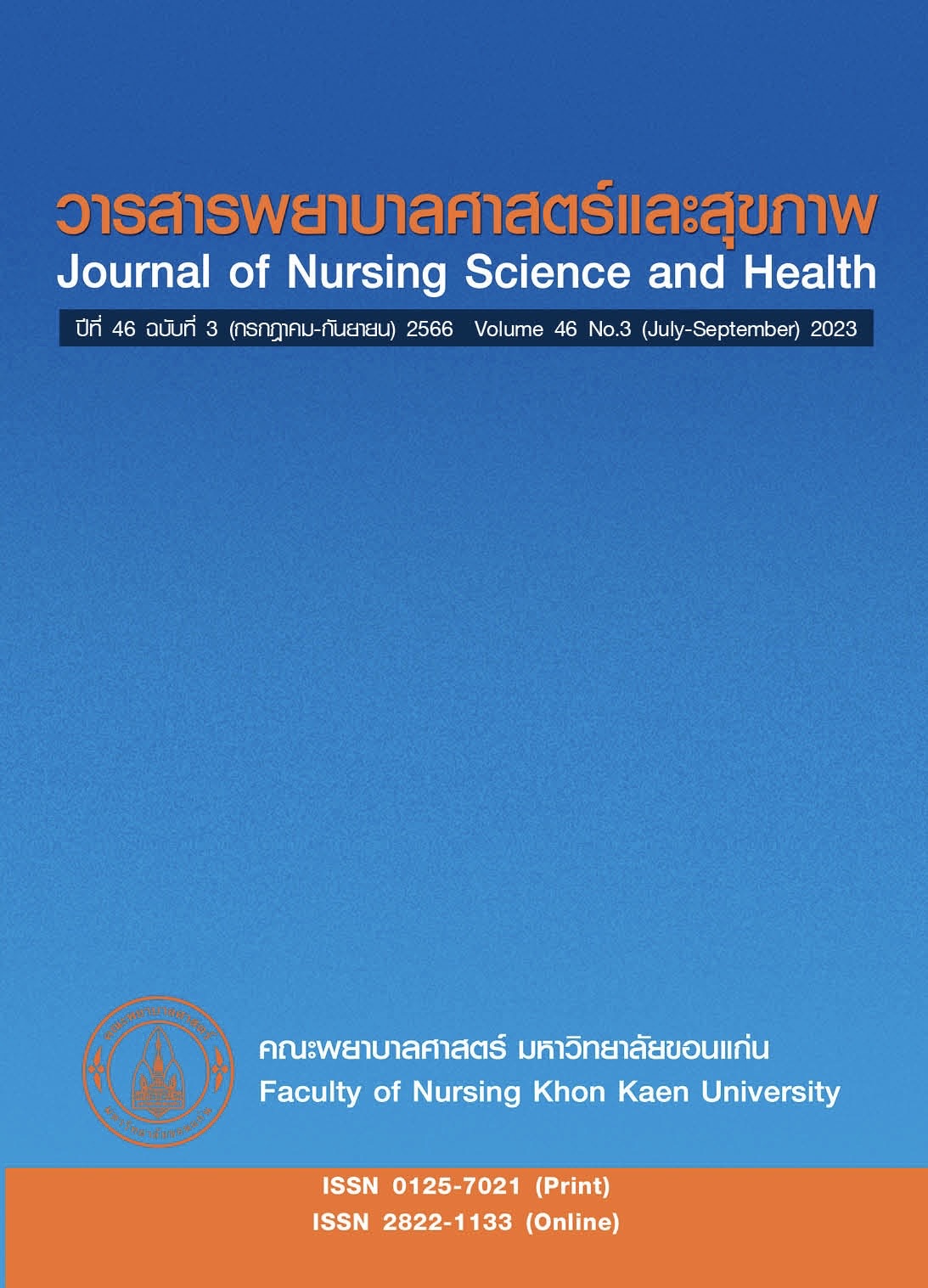ผลการเรียนรู้ของนักศึกษาพยาบาลในการปฏิบัติการพยาบาล ตามกรอบมาตรฐานคุณวุฒิระดับอุดมศึกษาแห่งชาติ
คำสำคัญ:
ผลการเรียนรู้ , นักศึกษาพยาบาล, ครูคลินิก, กรอบมาตรฐานคุณวุฒิระดับอุดมศึกษาแห่งชาติบทคัดย่อ
การวิจัยเชิงพรรณนานี้ มีวัตถุประสงค์เพื่อศึกษาและเปรียบเทียบผลการเรียนรู้ของนักศึกษาพยาบาล ในการปฏิบัติการพยาบาลตามกรอบมาตรฐานคุณวุฒิระดับอุดมศึกษาแห่งชาติ ตามการประเมินของครูคลินิก และนักศึกษาพยาบาล กลุ่มตัวอย่างเป็นครูคลินิก จำนวน 27 คน และนักศึกษาพยาบาล ชั้นปีที่ 4 ที่จะสำเร็จการ ศึกษาในปีการศึกษา 2565 จำนวน 30 คน ของคณะพยาบาลศาสตร์ มหาวิทยาลัยเอกชนแห่งหนึ่ง เครื่องมือ ที่ใช้เป็นแบบประเมินผลการเรียนรู้ตามกรอบมาตรฐานคุณวุฒิระดับอุดมศึกษา 6 ด้าน มีมาตรวัดแบบประเมิน ค่า 5 ระดับ ใช้เกณฑ์การแบ่งระดับผลการเรียนรู้ตามคะแนนเฉลี่ยอิงเกณฑ์ออกเป็น 3 ระดับ คือระดับมาก ปานกลาง และน้อย ทดสอบความเชื่อมั่นของแบบประเมินได้ค่าสัมประสิทธิ์แอลฟ่าครอนบาคของครูคลินิก และนักศึกษาเท่ากัน เท่ากับ .96 วิเคราะห์ข้อมูลด้วยสถิติเชิงพรรณนา และการทดสอบที
ผลการวิจัยพบว่า ครูคลินิกประเมินผลการเรียนรู้ของนักศึกษาโดยรวมอยู่ในระดับปานกลาง ผลการเรียนรู้ รายด้านพบว่า ด้านคุณธรรม จริยธรรม และด้านความสัมพันธ์ระหว่างบุคคลและความรับผิดชอบ อยู่ในระดับมาก ส่วนด้านอื่น ๆ อยู่ในระดับปานกลาง ส่วนนักศึกษาประเมินผลการเรียนรู้ตนเองโดยรวมและทุกรายด้านอยู่ในระดับ มาก ครูคลินิกประเมินผลการเรียนรู้ด้านความรู้และทักษะปฏิบัติวิชาชีพของนักศึกษาในระดับปานกลาง ในขณะที่ นักศึกษาประเมินผลการเรียนรู้ของตนเองด้านนี้ในระดับสูง เมื่อเปรียบเทียบการประเมินผลการเรียนรู้ของนักศึกษา ของครูคลินิกและนักศึกษา พบว่ามีความแตกต่างกันอย่างมีนัยสำคัญทางสถิติทุกรายด้านและโดยรวม ข้อเสนอ ที่สำคัญเน้นผลการเรียนรู้ระดับปานกลาง ที่ควรนำไปพิจารณาหาแนวทางในการจัดการเรียนการสอนเพื่อเพิ่ม ผลการเรียนรู้
เอกสารอ้างอิง
Netimetee S, Duangsamran D. Factors influencing academic achievement in maternal-child nursing and midwifery 1 of nursing students, Faculty of Nursing, Private University. Udonthani Hospital Medical Journal 2021;29(3):204-20. (in Thai)
Committee on Higher Education Standards. Announcement of the commission on higher education standards 2022. Bangkok: Office of the Higher Education Standards Commission, Ministry of Education; 2022. (in Thai)
Phimchaisai P, Wongchantorn N. The factors influencing achievement of practicum in nursing care for mother, infant, and midwifery 1 of nursing students at a Private University in Nakhon Pathom Province. Journal of The Royal Thai Army Nurses 2018;19(1):154-63. (in Thai)
Nursing Council. Bachelor of nursing program: Nursing council model program 2021. Nonthaburi: Nursing Council; 2021. (in Thai)
Surjadi M, Stringari-Murray S, Saxe JM. Entrustable professional activities in nurse practitioner education. J Nurse Pract 2019;15(5):97–102.
Franklin N, Melville P. Competency assessment tools: An exploration of the pedagogical issues facing competency assessment for nurses in the clinical environment. Collegian 2015;22(1):25-31.
El-Haddad C, Damodaran A, McNeil HP, Hu W. The ABCs of entrustable professional activities: An overview of entrustable professional activities’in medical education. Int Medical J 2016; 46(9):1006-10.
Al-Moteri M. Entrustable professional activities in nursing: A concept analysis. Int J Nurs Sci 2020;7(3):277–84.
Nursing Council. Regulations of the nursingb council on approval of professional nursing and midwifery education programs 2020. Nonthaburi: Nursing Council; 2020. (in Thai) 10. Bureau of Higher Education Standards and Evaluation. Standard criteria for higher education curriculum 2015 and related standards higher education level. Bangkok: Office of the Higher Education Standards Commission, Ministry of Education; 2017. (in Thai)
Bloom BS. Handbook on formative and summative evaluation of student learning. New York: McGraw–Hill; 1971.
Singhatadgid W, Sombatkaew N. Evaluations of teaching-learning strategies in the practicum of the fundamental of nursing course, The Thai Red Cross College of Nursing. Thai Red Cross Nursing Journal 2019;12(1):177-93. (in Thai)
Kamdaeng P. Supervision in clinical practice regarding expectations of nursing students. Journal of Nurses Association of Thailand Northern Region 2021;27(1):17-28. (in Thai)
Intaranongpai S, Kotchakot J. The learning outcome under the qualification framework for higher education (TOF) in community nursing practicum subject, bachelor of nursing science. Journal of The Police Nurses 2017;9(2):104- 14. (in Thai)
Benner P. From novice to expert: excellence and power in clinical nursing practice. California: Addison-Wesley; 1984.
Kooariyakul A. Clinical learning assessment of nursing students. Journal of Boromarajonani College Nursing Bangkok 2017;33(2):179- 87. (in Thai)
Kamdaeng P, Jaijoy K. The expectation and actuality of learning outcome in SN. 282 fundamentals of nursing practicum among second year nursing students, McCormick Faculty of Nursing, Payap University. JNATNO 2019; 25(1):36-48. (in Thai)
Chaiboonruang T, Yimyam S. International nursing programme students’ pregnancy care efficacy. Thai Journal of Nursing Council 2013; 28(3):55-67. (in Thai)
ดาวน์โหลด
เผยแพร่แล้ว
รูปแบบการอ้างอิง
ฉบับ
ประเภทบทความ
สัญญาอนุญาต
ลิขสิทธิ์ (c) 2023 วารสารพยาบาลศาสตร์และสุขภาพ

อนุญาตภายใต้เงื่อนไข Creative Commons Attribution-NonCommercial-NoDerivatives 4.0 International License.
วารสารพยาบาลศาสตร์และสุขภาพเป็นเจ้าของลิขสิทธิ์ในการเผยแพร่ผลงานที่ตีพิมพ์ห้ามผู้ใดนำบทความที่ได้รับการตีพิมพ์ในวารสารพยาบาลศาสตร์และสุขภาพไปเผยแพร่ในลักษณะต่าง ๆ ดังนี้ การนำบทความไปเผยแพร่ออนไลน์ การถ่ายเอกสารบทความเพื่อกิจกรรมที่ไม่ใช่การเรียนการสอน การส่งบทความไปตีพิมพ์เผยแพร่ที่อื่น ยกเว้นเสียแต่ได้รับอนุญาตจากวารสารพยาบาลศาสตร์และสุขภาพ



